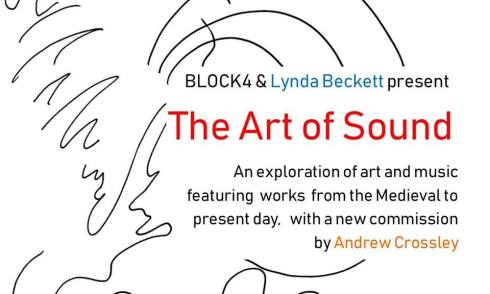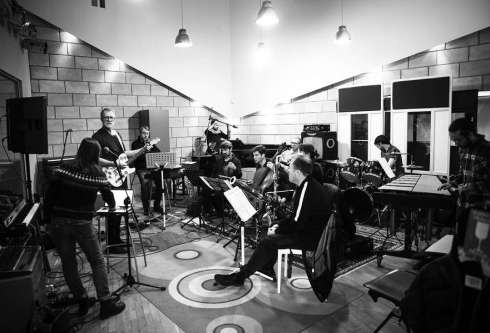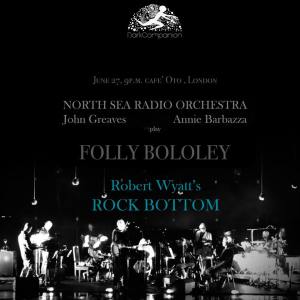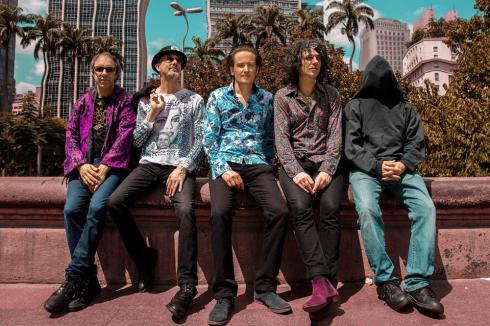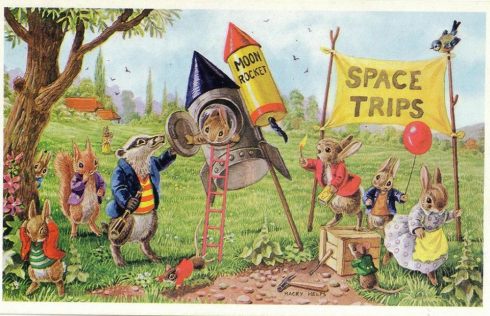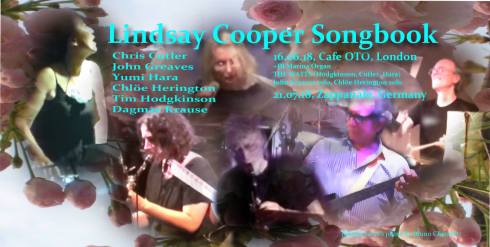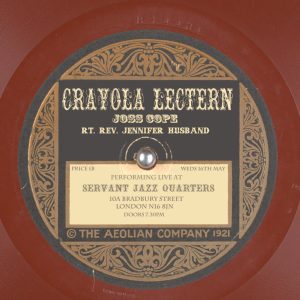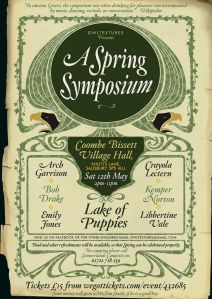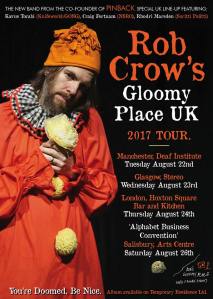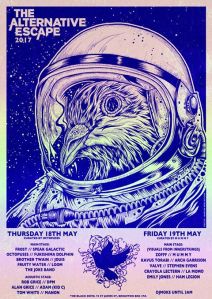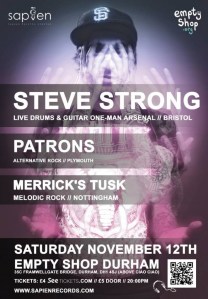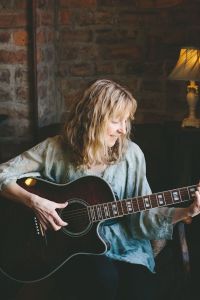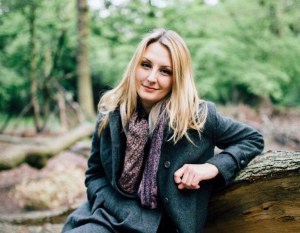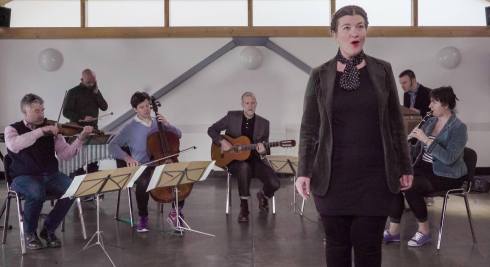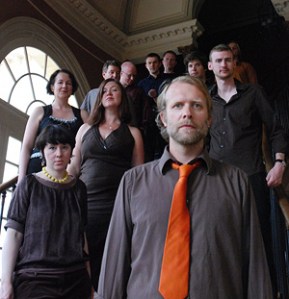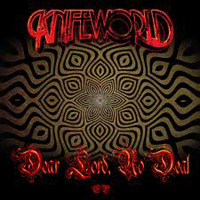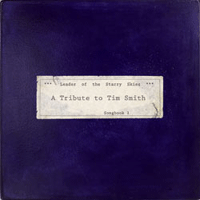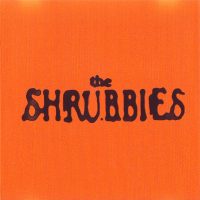“If you are lonely, I’ll be lonely too. / Find yourself a wall and I’ll hang next to you. / It won’t be easier hanging there that way / but we can be a diptych for the light of day…”
Craig Fortnam has spent two decades building a distinct style, both with North Sea Radio Orchestra (leafy, nostalgia-toned English chamber music drawing ever closer to lucid, Canterbury-esque psychedelia) and with Arch Garrison (slimmed-down duo/trio songwriting with more upfront personal concerns and a ranging freedom). It’s not surprising that his first solo material (at least, the first released under his name alone) falls close in tone to both of his previous projects. It’s also still very much a family affair, with the Garrison’s James Larcombe contributing piano and a delicately shrunken raft of other NSRO members adding strings, reeds and vibraphone.
‘Ark’ (the title track of Craig’s forthcoming album) is still redolent with dark walled-garden curlicues of NSRO bassoon and cello, gently astringent viola, bumble-bee monosynth and twinkling glockenspiel; all of it pumping away like steam-workings under the naive strum of guitar and Craig’s unaffected Wyatt-ish drone of vocal. Impacted by his loves and losses in the past few years – not least the death of his mentor Tim Smith – it’s downbeat, uneasy and self-effacing in a particular English fashion (a way that still throbs and flows on beneath current aggressive Brexit blustering). As a song, it’s in part a retreat and an admission of fear in ominous times. Craig’s never looked as vulnerable as he does in the video, fumbling around his rehearsal room, gazing anxiously through thick glasses, gently contorted around his guitar or haltingly reassembling broken-down instruments.
However, it’s also a frail but faithful statement of empathy and loyalty in times of threat – a recognition that trust can be rebuilt in the face of despondency. An unexpected coda with a new hint of furrowed darkness suggests that Craig has swapped some of those NSRO green leaves for a bag of tougher, tarter limes; but he’s shored up the delicate song-line, made strengthening bulwarks to share. “Two by two, I’ll paint the people in” sings Craig, “with all my deepest longing.” The clouds may be fat and dark, the cliffs may be crumbling, lights may be going out in the little houses everywhere; but community starts with two, and then another two.
When much of California went up in relentless wildfires last year, blotting out much of the Pacific seaboard in a broil of toxic brown smoke, it left scars – economic, geographical, psychic. Singer/composer Gabriella Smith might live mostly in Marseille these days, but her roots are thoroughly Californian, emotionally entwined with the hiking trails through forests and over rocks in the wild places, now little more than ash and scorching. Composed on the hoof as she paced helplessly in the Bay Area, unable to stop the despoilment from the raging fires, ‘Bard of a Wasteland’ is the first part of a fierce lament over the wrecking of her countryside.
Rage pushes at the roots of Gabriella’s soft conversational soprano, beginning to unweave its politeness, swooping through its steel-guitar pitching and murmurs. Meanwhile, her collaborator (the genre-flexing New York cellist Gabriel Cabezas) makes his cello sound like – and do – everything else. Jazz swoops and purring, fretless Mediterranean bass lines of the Mick Karn kind; quivering tremolo ornaments to the vocal melodies; staccato thumps and strums; subtle screeches of desert birdcall; reedy drones and a rainfall pattering of fingertip percussion.
All of this is layered into flexing rhythmical and methodic song-loops, perhaps owing something to Arthur Russell’s cello-beat, to African cycles and Italian tarantellas, in which Gabriel explores the rub and the push of instrumental voices while Gabriella digs into root causes of neglect and responsibility, of strip-mining the future and impoverishing the present. “You left us with fire / and we let it burn / You lined your pockets with the breath of your children,” she sings. “All you leave is a wasteland / And we’re fighting to breathe on.” As music, it’s pretty thrilling, it’s rhythm teasing your ankles and hips into dancing. As a story, it’s unresolved and inconclusive: as it has to be, as Gabriella starts to piece together her own emotions, to find out what her new place is, and where she sits on the chain of responsibility (if not the roster of blame).
“Lost time. / Another lick of the tide, / another loop in a line…. / Far enough from the slaughter, / close enough to the dam, / I lost the dream of a daughter / to be the bard of a wasteland.” It’s a reminder that protection of a landscape comes with sustaining one’s own awareness of and connection to it. Gabriella is performing the start of a war dance on hers, to remind those who failed their duties that this kind of failure matters.
On ‘ABBA/Mary’, ambient-classical composer and onetime Dead Texan Christina Vantzou effects a two-on-one remix of eerie New York post-classical rebels LEYA, whose threnodic conflations of violin, harp, unusual intervals and porously melancholic male-alto vocalising have enthralled various freak-pits, noise-dens, art-porn movies and other liminal performance spaces ever since they formed. The originals sound like weeping shroud-cloths peeled off the sleeping bodies of castrati. They’re disturbingly beautiful, their lyrics indistinct and parched, and they’re also deliciously unmoored from time, from strictness of gender, from tone-temperament. ‘ABBA‘ is a meeting of undulant string fades and detuned harp; ‘Mary‘ is more slanted towards traditional balladry and baroque continuo.
The Vantzou blending produces quite a different hybrid. Swimming in on a tide of fluting, falling vocal samples, its shifting spine is built from gentle alteration to ‘Mary’s harp continuo. Of the vocals, Marilu Donovan’s wispy backings are moved more upfront and given their moment in the spotlight; while Adam Marciewicz’s alto is further detached from its blurred storytelling role, now echoing protracted yearning syllables in distant corridors. Throughout, gentle background interruptions prod and nudge LEYA’s original building blocks as Vantzou mixes in computer blips, finger cymbals and insect chirps and the kind of electronic glissandi you’d expected to hear in vintage psychedelic science fiction.
Building assertively on LEYA’s taste for detuning, Vantzou also brings regular and unsettling shifts in pitching, progressing the music from chord to subtly dissonant chord. You’re never entirely sure where you’re being led, other than down a staircase in which the steps are each of different, treacherous sizes. There is no particular ending or straightforward resolution: the component fragments fray and ghost out together, the last sigh of a spectral tape.
Craig Fortnam: ‘Ark’
Onomatopoeia Records (no catalogue number or barcode)
Download-only single
Released: 14th May 2021
Get/stream it from:
Bandcamp (free download with album pre-order), Soundcloud, Amazon Music, Spotify, Shazam
Craig Fortnam online:
Facebook, Bandcamp, Last.fm, Apple Music, YouTube, Vimeo, Spotify, Amazon Music, Shazam
Gabriella Smith/Gabriel Cabezas: ‘Bard of a Wasteland‘
Bedroom Community Records (no catalogue number or barcode)
Download/streaming single
Released: 14th May 2021
Get/stream it from:
Bandcamp, Apple Music, Deezer, Spotify, Amazon Music
Gabriella Smith online:
Homepage, Soundcloud, Bandcamp, Last.fm, Apple Music, YouTube, Deezer, Spotify, Amazon Music
Gabriel Cabezas online:
Homepage, Facebook, Twitter, Soundcloud, Bandcamp, Last.fm, Apple Music, YouTube, Deezer, Spotify, Instagram, Amazon Music
LEYA: ‘ABBA/Mary’ (Christina Vantzou remix)
NNA Tapes (no catalogue number or barcode)
Download/streaming single
Released: 17th May 2021
Get/stream it from:
Bandcamp, Apple Music, YouTube, Spotify, Tidal, Amazon Music
LEYA online:
Facebook, Bandcamp, Last.fm, Apple Music, Spotify, Tidal, Amazon Music
Christina Vantzou online:
Homepage, Facebook, Twitter, MySpace, Soundcloud, Bandcamp, Last.fm, Apple Music, YouTube, Vimeo, Deezer, Pandora, Spotify, Tidal, Amazon Music

